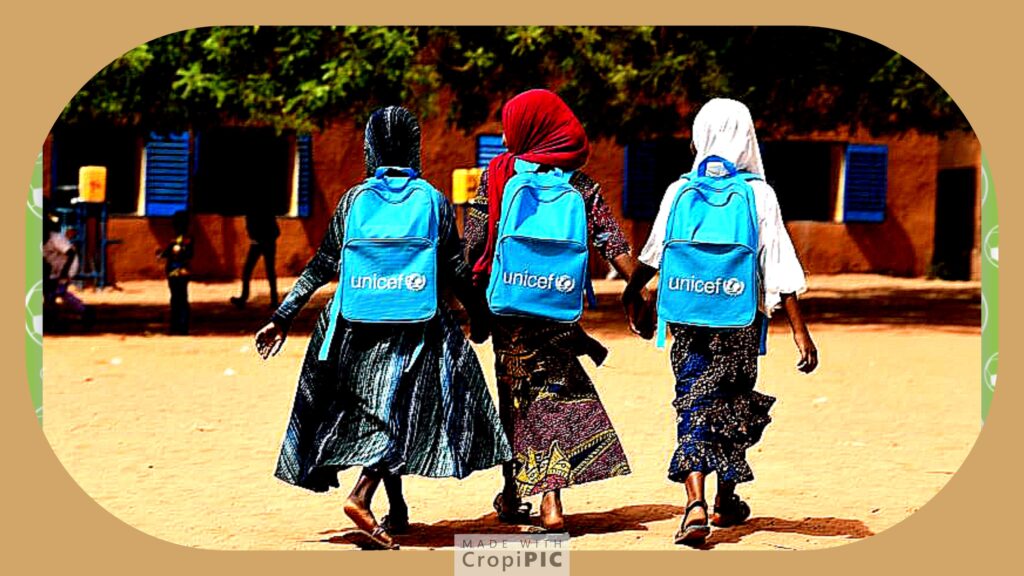The United Nations International Children’s Emergency Fund (UNICEF) has again raised concern over the twin crises of a large and growing out-of-school population and severe learning poverty currently facing Nigeria
This came to the fore UNICEF distributed 2,760 solar-powered radio sets to the Katsina State Universal Basic Education Board (SUBEB) for students in the security frontline communities to learn lessons.
In his address during a Media Dialogue on Retention, Transition, and Completion (RTC) and Re-entry Guidelines for Adolescent Girls in the State, the Chief of Field, UNICEF Field Office Kano, Rahama Farah however rued the growing out-of-school children population in Nigeria.
“One in three children are out of school (OOS) (10.2 million at primary school level and 8.1 million children at junior secondary level), and according to the Multiple Indicator Cluster Survey (MICS) 2021, three in four children aged 7-14 years cannot read with understanding or solve a simple mathematics problem”.
Explaining further, he said one in three children is out of school in Nigeria, representing 10.2 million at the primary school level and 8.1 million children at the junior secondary level.
Farah said that UNICEF, and partners such as the World Bank, the European Union, and the FCDO have collaborated with AGILE and BESDA projects to support Katsina State and governments in the North-West to reprioritise investments in education and to mitigate against the declining state of education in terms of access, participation and quality of learning outcomes.
“We are all here because our education system is in a crisis; a crisis characterised by a high number of out-of-school children, low attendance and participation rates, low transition rates, low completion rates, poor learning outcomes, and low skills acquisition for children at all levels.
“These issues characterising the education system are at the backdrop of high insecurity in the North-West and, Katsina and Zamfara states; low financing to education; poorly resourced schools; low teacher competency levels and high pupil-teacher ratio, among others.
“Together, these factors lead to low overall education attainment, hamper social and economic opportunities for young people, and perpetuate intergenerational cycles of poverty and inequality.
“Stalled progress on Sustainable Development Goal (SDG) 4 will affect regional and global development as Nigeria accounts for the largest global (15 per cent) and regional (33 per cent) share of OOS children.
“Education indicators are the lowest for adolescent girls in the North-east and North-West Nigeria, especially children from poor families and those in rural and security-compromised areas.
“In 2021 alone, a least 25 schools were attacked, directly impacting 1,446 learners and 24 personnel. Seventy-six percent of the attacks took place in the Northwest.
“Kaduna was the most frequently attacked (8 out of 25 attacks). Katsina (344 learners) followed by Zamfara states (327 learners) reported the highest number of abductees taken in a single abduction.
“As a precautionary measure, in the 2020/21 academic year, over 11,000 schools were closed for four months, significantly disrupting the education of 1.3 million children.
“The OOS phenomenon is fueled by the growing child population placing significant pressure on the delivery of social services. Yet education financing has not kept pace with a burgeoning demand for education and the high fertility rate.
“Nigeria spends 1.2 per cent of GDP on education, far lower than other African countries and notably lower than the international benchmark of four to six per cent.
“Insufficient domestic financing results in a shortfall of 378,000 classrooms and approximately 278,000 teachers.
“This leads to high student-teacher ratios (e.g., 55:1 at the primary level) and additional pressure on teachers whose capacity is already limited, as 50 per cent of basic education teachers lack the Nigerian Certificate in Education (NCE) or the minimum teaching qualification. What is more, in each workday, 20 per cent of primary school teachers are absent.
“Inadequate and unsafe school infrastructure, poor teaching quality, and low learning outcomes are exacerbated by insecurity and school attacks and compounded by staggering poverty and negative social norms on education, particularly for girls.”
Keep Reading
Add A Comment


